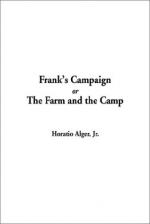At a desk behind him sits John Haynes, the son of Squire Haynes, introduced in our last chapter. He is nearly two years older than Frank, and about as opposite to him in personal appearance as can well be imagined. He has a thin face, very black hair is tall of his age, and already beginning to feel himself a young man. His manner is full of pretension. He never forgets that his father is the richest man in town, and can afford to give him advantages superior to those possessed by his schoolfellows. He has a moderate share of ability but is disinclined to work hard. His affectation of Superiority makes him as unpopular among his schoolfellows as Frank is popular.
These two boys, together with Henry Tufts, constitute the preparatory class of Rossville Academy. Henry is mild in his manners, and a respectable student, but possesses no positive character. He comes from a town ten miles distant, and boards with the principal. Frank, though the youngest of the three, excels the other two in scholarship. But there is some doubt whether he will be able to go to college. His father is in moderate circumstances, deriving a comfortable subsistence from a small farm, but is able to lay by a very small surplus every year, and this he feels it necessary to hold in reserve for the liquidation of the mortgage held by Squire Haynes. Frank’s chance of attaining what he covets-a college education-seems small; but he is resolved at least to prepare for college, feeling that even this will constitute a very respectable education.
The reader is introduced to the main schoolroom of the Rossville Academy on the morning of the day of which the war meeting takes place.
At nine o’clock the bell rang, and the scholars took their seats. After the preliminary devotional exercise, Mr. Rathburn, instead of calling up the first class at once, paused a moment, and spoke as follows:
“Scholars, I need not remind you that on the first day of the term, with the design of encouraging you to aim at improvement in English composition, I offered two prizes-one for the best essay written by a boy over fourteen years of age; the other for the best composition by any one under that age. It gives me pleasure to state that in most of those submitted to me I recognize merit, and I should be glad if it were in my power to give three times as many prizes. Those of you, however, who are unsuccessful will feel repaid by the benefit you have yourselves derived from the efforts you have made for another end.”
During this address, John Haynes looked about him with an air of complacency and importance. He felt little doubt that his own essay on the “Military Genius of Napoleon” would win the prize. He did not so much care for this, except for the credit it would give him. But his father, who was ambitious for him, had promised him twenty-five dollars if he succeeded, and he had already appropriated this sum in imagination. He had determined to invest it in a handsome boat which he had seen for sale in Boston on his last visit to that city.




